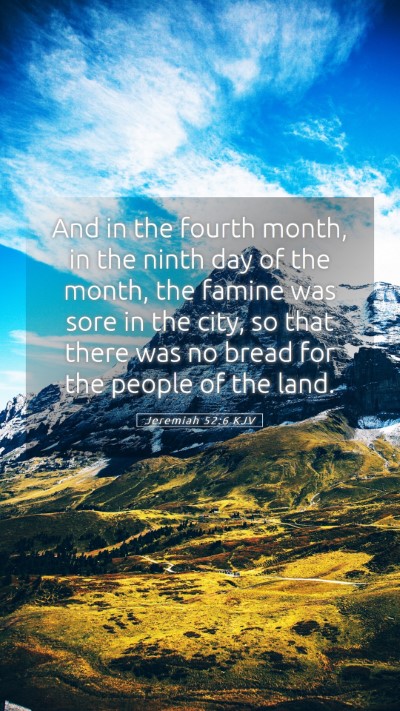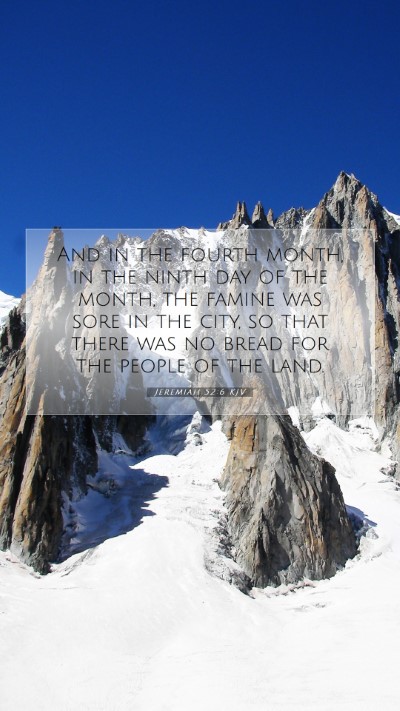Understanding Jeremiah 52:6
In this analysis, we delve deep into the meaning and implications of Jeremiah 52:6, exploring various public domain commentaries to provide insights for those seeking Bible verse meanings, Bible verse interpretations, and Bible verse explanations.
Text of Jeremiah 52:6
"And in the fourth month, in the ninth day of the month, the famine was sore in the city, so that there was no bread for the people of the land."
Overview of the Context
This verse is part of the concluding chapter of the book of Jeremiah, which describes the dire conditions in Jerusalem as it faces the Babylonian siege. The city is in a state of desperation, highlighting the consequences of disobedience to God.
Commentary Insights
According to public domain commentaries:
-
Matthew Henry notes that this verse emphasizes the severity of the famine, a direct result of the city's isolation and punishment. He suggests that this disaster serves as a sobering reminder of the repercussions of sin and the abandonment of divine guidance.
-
Albert Barnes highlights the specific timing of the events, pointing out that the fourth month corresponds to a critical phase of the siege. He interprets this as a fulfillment of Jeremiah's previous prophecies concerning the downfall of Jerusalem and the dire straits that would follow.
-
Adam Clarke provides a historical analysis, indicating that this famine was among the last afflictions suffered by the people. Clarke reflects on the psychological impact of such hardships, where hope dwindles as basic necessities become scarce, thus illustrating the desperation of the situation.
Thematic Analysis
This verse encapsulates several themes crucial for understanding Scripture:
- Judgment and Consequence: The famine signifies divine judgment upon the nation for their transgressions.
- Historical Context: It situates the reader within a historical framework of siege and suffering, urging a reflection on the importance of obedience to God.
- Human Despair: It paints a poignant picture of human suffering and the need for divine mercy.
Application to Daily Life
Understanding this verse resonates with the modern reader in various ways:
- It serves as a reminder to remain spiritually vigilant and obedient to God's guidance to avoid hardships.
- The verse encourages reflection on one's personal circumstances and the importance of seeking divine provision in times of need.
- It highlights the necessity of fostering community support during challenging times, analogous to the city's need for bread.
Cross References
This verse relates to several other passages in the Bible that enrich its meaning:
- Lamentations 2:11-12: A lamentation over the desolation of Jerusalem and the suffering of its inhabitants.
- Ezekiel 4:16-17: A prophetic warning concerning famine and its implications on the people of Israel.
- Deuteronomy 28:53-57: A warning of the ultimate consequences of disobedience, including famine.
Conclusion
In summary, Jeremiah 52:6 serves as a powerful reminder of the consequences of sin and the importance of faithfulness to God's word. Through various interpretations and analyses, individuals engaged in Bible study can gain crucial insights into the character of God, the nature of judgment, and the significance of repentance.
For those seeking deeper understanding of Scripture, this verse opens doors to valuable Bible study resources and Bible study tools that enhance one’s ability to interpret and apply the Scriptures in everyday life.


